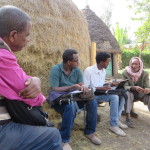This document summarizes material found in four documents prepared as part of the 2014 evaluation of the impact of Ethiopia’s Productive Safety Net Programme,
Social protection, household size and its determinants: Evidence from Ethiopia
ESSP Working Paper 107, by John F. Hoddinott, Tseday J. Mekasha. Abstract: We examine the impact of a social protection program, Ethiopia’s Productive Safety Net Programme (PSNP),
Synopsis: Economy-wide impacts of the Productive Safety Net Programme (PSNP)
ESSP Research Note 57: by Mateusz Filipski, J. Edward Taylor, Getachew Ahmed Abegaz, Tadele Ferede, Alemayehu Seyoum Taffesse, and Xinshen Diao. Abstract: The findings from this study reveal that, on an economy-wide basis, the benefits of PSNP significantly exceed the cost of PSNP transfers.
What is the optimal locus of control for social assistance programs? Evidence from the productive safety net programme in Ethiopia
ESSP Working Paper 86, by Andrew M. Simons. Abstract: Centralized implementation mandates of Ethiopia’s Productive Safety Net Program (PSNP) require a full and uniform payment to each person in an eligible household.
Helping to make programs nutrition sensitive
The Government of Ethiopia’s Productive Safety Net Programme (PSNP) is one of the largest social protection programmes in sub-Saharan Africa. IFPRI and ESSP have been working on the PSNP with the government and its development partners since 2006 as the external independent programme evaluator. As part of this collaboration, IFPRI and ESSP have worked with […]




